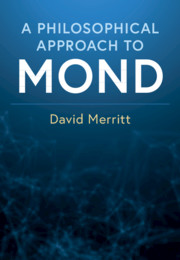Book contents
- Frontmatter
- Dedication
- Contents
- Preface
- 1 The Epistemology of Science
- 2 The Methodology of Scientific Research Programs
- 3 The Milgromian Research Program
- 4 Theory Variant T0: The Foundational Postulates
- 5 Theory Variant T1: A Non-relativistic Lagrangian
- 6 Theory Variant T2: A Relativistic Theory
- 7 Theory Variant T3: A Modified Hard Core
- 8 Convergence
- 9 Summary / Final Thoughts
- References
- Index
1 - The Epistemology of Science
Published online by Cambridge University Press: 20 April 2020
- Frontmatter
- Dedication
- Contents
- Preface
- 1 The Epistemology of Science
- 2 The Methodology of Scientific Research Programs
- 3 The Milgromian Research Program
- 4 Theory Variant T0: The Foundational Postulates
- 5 Theory Variant T1: A Non-relativistic Lagrangian
- 6 Theory Variant T2: A Relativistic Theory
- 7 Theory Variant T3: A Modified Hard Core
- 8 Convergence
- 9 Summary / Final Thoughts
- References
- Index
Summary
Scientific epistemology begins from the idea that the truth of a universal statement, such as a scientific law, can never be conclusively proved. No matter how successful a hypothesis has been in the past, it can always turn out to make incorrect predictions when applied in a new situation. Karl Popper argued that the most important experimental results are those that falsify a theory, and he proposed falsifiability as a criterion for distinguishing science from pseudoscience. Popper argued in addition that scientists should respond to falsifications in a particular way: not by ad hoc adjustments of their theories, but in a way that expands the theory’s explanatory content. Popper argued that the success of a modified theory should be judged in terms of its success at making new predictions. Popper’s view of epistemology, which is shared by many scientists and philosophers of science, is called “critical rationalism.” An epistemology that judges success purely in terms of a theory’s success at explaining known facts is called “verificationism.” Popper argued that verificationism is equivalent to a belief in induction, and that induction is a fallacy.
Keywords
- Type
- Chapter
- Information
- A Philosophical Approach to MONDAssessing the Milgromian Research Program in Cosmology, pp. 1 - 19Publisher: Cambridge University PressPrint publication year: 2020

